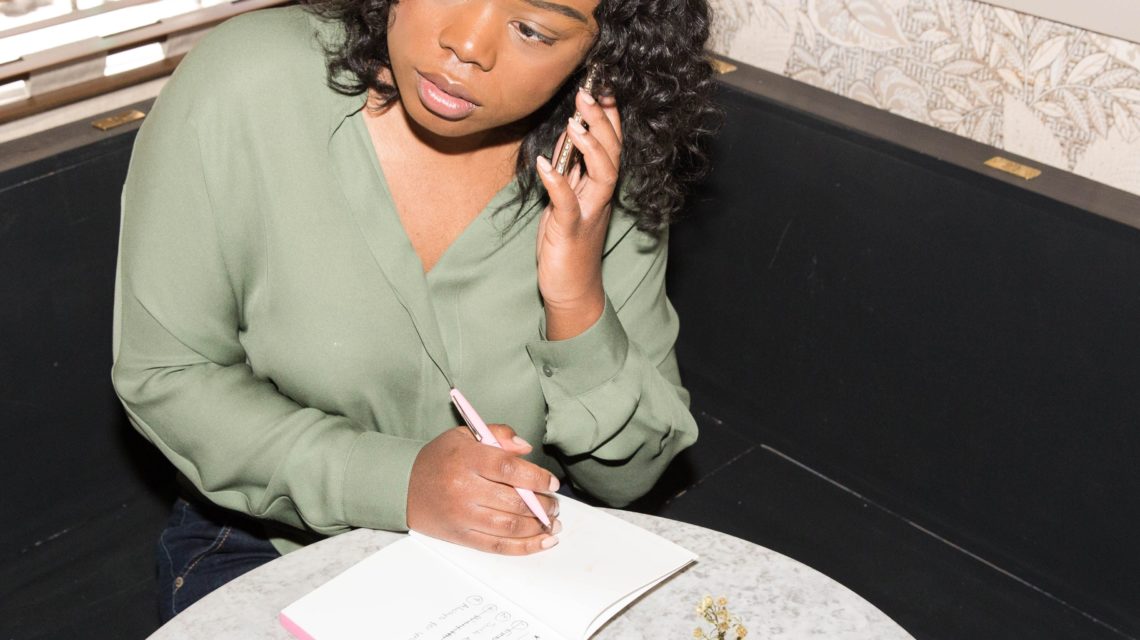By Anabel Parsarow
Refinery 29, October 23, 2018 —
Congrats, you’ve made it up and out of the résumé pile and into round one of your journey towards landing a new job: the phone interview, which is definitely no small feat! But — surprise! — it’s tomorrow (and you have work tomorrow…at the job you already have). So what do you do?

(Photo: Nicolas Bloise)
Phone interviews are the first point of contact with your prospective employer. Since you can’t rely on in-person cues and body language to aid in your communication, they require extra focus, preparation, and engagement in order to really nail. Ahead, we rounded up the questions you need to be prepared to answer, questions to be prepared to ask, environmental factors to control, and, most importantly, the little things you can do to stand out in order to guarantee round two: an in-person interview in your near future.
“Be prepared for questions (to answer — and to ask).
”
Just like you would for an in-person interview, be sure to do some prep the night before your phone interview by asking yourself hypothetical interview questions and planning out how you might answer them. Similarly, write out questions to ask your potential employer — not only to get clarity on the position you’re applying for, but to demonstrate your level of interest and the degree of research you’ve done prior to the interview. According to a LinkIn study, 41% of all interviewers say that asking well-informed questions is one of their top qualifications for a candidate.
And don’t worry if you have to pause for a moment to collect your thoughts — it’s better to have a few seconds of silence over the phone than to panic and spew out an answer you haven’t fully thought through. Just remember that pauses can seem louder and longer over the phone than they otherwise would in person, and that they’re natural in conversation.
For your final question, be sure to ask about next steps — this shows you’re interested, proactive, and serious about the job.
“Find a good spot and make sure the connection is clear.
”
Don’t just assume you’ll just find an empty bench to sit on during your lunch break five minutes before the interview is set to start. Plan ahead and reserve a conference room, sit in your car, or find another spot in advance that you know will be quiet and available during your interview time slot. Be sure to test the phone service in the spot beforehand, too. We all know what it’s like to have a spotty connection on an important call.
Blair Decembrele, a career expert at LinkedIn, adds: “Set yourself up for success and don’t take your interview in a public place or on speakerphone. Since you’ll probably want your hands free, test your headphones or hands free device to make sure you’re all set when the hiring manager calls. Eliminate distractions like internet browsing, eating or drinking, or listening to the TV or radio in the background, all of which can be a distraction not just to yourself, but to the interviewer as well.”
Remember: Just as important as a clear connection is a clear mind. Do all the stuff you would to get mentally ready for an in-person interview — like getting a full night of rest, drinking a cup of coffee if you need caffeine to turn your brain on, or even dressing in an interview outfit — to help you feel the part.
“Break the ice.
”
Since you aren’t there in person (and therefore can’t make eye contact or establish rapport IRL), it’s especially important to make a personal connection on the phone.
Decembrele recommends doing some groundwork: “Finding a mutual connection within your LinkedIn network is an easy way to establish common ground during the interview. Almost one-third (29%) of professionals say that a strong personal connection and easy conversation is one of the most important qualities they look for in a potential candidate.”
If you don’t have a mutual connection, don’t worry. Take a look at your interviewer’s profile and do a quick Google search to learn about them and the company’s people and culture. “Mentioning shared interests, mutual connections, or even their alma mater are great icebreakers,” says Decembrele.
“Have your résumé handy.
”
You’ll want to have your résumé, cover letter, and, if possible, the job posting itself right in front of you so that you can reference any of the three easily and quickly. That way, if your nerves get the best of you, you have notes and talking points to fall back on.
And speaking of notes, it helps to bullet point or annotate your resume by highlighting specific lines you want to be sure to emphasize while you’re on the phone and have the hiring manager’s ear. It’ll be a lot more lively than reading your resume to them, since they’ll likely have it in front of them too for the interview.
“Don’t forget to follow up.
”
Even though phone interviews are more casual than in-person interviews, it’s still important to thank your interviewer for their time and consideration afterwards by sending a thoughtful thank you email.
Don’t have their work email address? Decembrele says it’s appropriate to send them a note on LinkedIn Messenger. Just as long as you beat them to the post-interview punch and reach out before they do!










